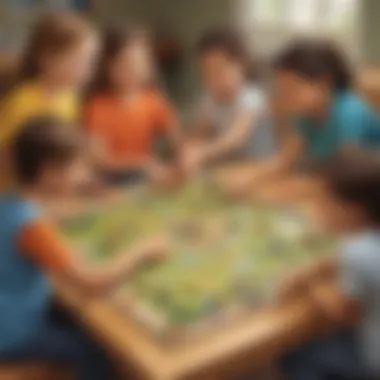Innovative Strategies for Developing Children's Social Skills Through Engaging Lesson Plans


Interactive Learning Games
Educational Topics
Exploring educational topics is integral to nurturing children's social skills and emotional intelligence. A compilation of articles covering subjects like math, science, languages, and more provides a diverse range of learning opportunities for young learners. Interdisciplinary learning is emphasized for its role in holistic development, as it enables children to make meaningful connections across various fields, fostering a well-rounded educational experience.
Tips and Tricks
Practical tips for parents and educators are essential for enhancing children's learning journey. Strategies for making learning fun and engaging, such as incorporating gamification techniques and interactive activities, empower adults to create immersive educational environments. By implementing effective teaching methods tailored to each child's learning style, parents and educators can optimize the social skills development process while ensuring a personalized approach to learning.
Creative DIY Projects
Engaging children in creative do-it-yourself (DIY) projects sparks their creativity and promotes hands-on learning experiences. Step-by-step guides offer detailed instructions for crafting projects that encourage children to explore their artistic abilities. These hands-on activities not only enhance cognitive and motor skills but also foster a sense of independence and accomplishment. Creative craft ideas using simple household items exemplify the importance of artistic expression in children's development, providing them with opportunities for self-expression and creative exploration.
Introduction
In the realm of social skills development for children, engaging lesson plans play a vital role. This article aims to equip parents, teachers, and caregivers with innovative strategies to cultivate essential interpersonal skills in young learners. By providing a comprehensive array of activities, games, and exercises, this piece serves as a valuable resource in enhancing children's social competence and emotional intelligence.
Understanding the Importance of Social Skills Development
Impact on Relationships
Social skills have a profound impact on relationships, laying the foundation for meaningful connections and mutual understanding. The ability to communicate effectively, show empathy, and resolve conflicts positively influences the quality of relationships. This emphasis on nurturing healthy interactions is a cornerstone of this article, aligning with the goal of promoting children's social adeptness.
Academic and Professional Success
Not only do social skills enrich personal relationships, but they also contribute significantly to academic and professional success. Skills like teamwork, active listening, and collaboration are instrumental in educational settings and career advancement. This section emphasizes how honing these skills through engaging lesson plans can empower children for future achievements.
Emotional Well-being


Emotional well-being is intricately linked to social skills development. Teaching children to navigate their emotions, understand those of others, and manage conflicts constructively enhances their overall mental health. By addressing emotional intelligence in the context of social skills, this article underscores the holistic approach needed to foster well-rounded individuals.
Overview of Social Skills Lesson Plans
Key Components
The key components of social skills lesson plans encompass a range of crucial elements, including communication, empathy, conflict resolution, and cooperation. Each component is designed to instill specific skills that are essential for effective social interactions. By dissecting and exploring these components, this article aims to provide a comprehensive framework for designing impactful lesson plans.
Benefits for Children
The benefits of incorporating social skills lesson plans for children are multifaceted. From improved communication abilities to enhanced conflict resolution skills, these lesson plans offer a host of advantages. By delving into the specific benefits and outcomes that children can experience through engaging activities, this section highlights the transformative potential of social skills development.
Planning Engaging Activities
Interactive Games
Role-playing Scenarios
Role-playing scenarios offer a hands-on approach to social skill development by allowing children to step into various roles and navigate different social situations. This aspect of interactive games encourages empathy, perspective-taking, and problem-solving, essential elements for effective communication and relationship building. The key characteristic of role-playing scenarios lies in its ability to simulate real-life experiences in a controlled setting, providing children with opportunities to practice social cues, conflict resolution, and emotional regulation. The unique feature of role-playing scenarios is the versatility it offers in adapting to specific learning objectives and social dynamics, making it a valuable choice for this article. While it enhances children's social skills, role-playing scenarios also foster creativity, imagination, and adaptability.
Board Games with Social Themes
Integrating board games with social themes into lesson plans adds an element of fun and engagement while reinforcing social skills in children. These games focus on cooperative play, turn-taking, problem-solving, and strategic thinking, all crucial for effective social interaction. The key characteristic of board games with social themes is their ability to facilitate collaboration and communication among players, promoting teamwork and shared decision-making. This choice is beneficial for the article as it combines entertainment with learning, making social skill development enjoyable and rewarding. The unique feature of board games with social themes is their inherent structure that encourages players to interact, negotiate, and build relationships, enhancing not only social skills but also critical thinking and conflict resolution abilities.
Team-building Exercises
Team-building exercises are designed to foster camaraderie, trust, and cohesion among children, creating a sense of unity and mutual support within a group. The key characteristic of team-building exercises is their emphasis on cooperation, leadership, and problem-solving in a collaborative setting. This choice is popular for this article as it promotes interpersonal skills, communication, and respect for diverse opinions and contributions. The unique feature of team-building exercises is their capacity to instill values of teamwork, resilience, and empathy, instigating a sense of community and belonging among participants. While team-building exercises enhance social skills, they also cultivate resilience, adaptability, and conflict resolution strategies in children attending the activities in this article.
Incorporating Social Skills into Daily Routine
Incorporating social skills into daily routines plays a crucial role in shaping children's interpersonal abilities and emotional intelligence. By infusing social skill development into everyday activities, children can build a strong foundation for successful social interactions. This section will delve into various aspects of integrating social skills into daily routines, exploring the benefits, considerations, and effective strategies to nurture these essential skills.


Home Environment
Family Bonding Activities
Family bonding activities are a fundamental element in fostering social skills within the home environment. These activities promote bonding, communication, and teamwork among family members, contributing to a positive social atmosphere. The key characteristic of family bonding activities lies in their ability to strengthen relationships and create lasting memories. Engaging in activities such as family game nights, cooking together, or outdoor adventures enhances communication skills and reinforces the importance of connection and cooperation.
Mealtime Conversations
Mealtime conversations are another integral component of incorporating social skills into the daily routine. Shared meals provide an excellent opportunity for families to engage in meaningful discussions, share experiences, and practice active listening. The key characteristic of mealtime conversations is their ability to facilitate open communication and promote valuable social skills such as empathy and understanding. By encouraging regular mealtime conversations, families can strengthen relationships and cultivate essential interpersonal skills.
Emotional Regulation Practices
Emotional regulation practices serve as a vital aspect of promoting social skills within the home environment. Teaching children how to recognize and manage their emotions effectively contributes to their overall emotional intelligence and social competence. The unique feature of emotional regulation practices lies in their ability to empower children to express their feelings constructively and handle conflicts positively. By incorporating emotional regulation techniques into daily routines, parents can instill valuable skills that enable children to navigate social situations with resilience and empathy.
Evaluating Progress and Adjusting Strategies
In this article, the section on Evaluating Progress and Adjusting Strategies plays a crucial role in ensuring the effectiveness of social skills development plans for children. By regularly evaluating progress and adjusting strategies, parents, teachers, and caregivers can track the growth of social skills in young learners. This section focuses on specific elements such as monitoring the application of learned social skills, assessing behavior changes, and adapting lesson plans to meet evolving needs. Evaluating Progress and Adjusting Strategies are essential in identifying areas of improvement, celebrating milestones, and addressing challenges promptly. By incorporating this evaluative process, individuals can fine-tune social skills programs to maximize their impact on children's overall development. The benefits of this approach include enhanced communication abilities, improved conflict resolution skills, and increased self-awareness in children.
Tracking Development
- Observational Assessments
Observational Assessments
Observational Assessments provide a valuable means of gauging a child's social progress in real-time. By discreetly observing interactions, behaviors, and responses, caregivers can gain insights into a child's social capabilities and areas for improvement. The key characteristic of Observational Assessments lies in their non-intrusive nature, allowing for natural behavior display without the influence of formal assessments. This method is a popular choice for this article as it offers a holistic view of a child's social interactions within various contexts. The unique feature of Observational Assessments is their ability to capture nuanced social dynamics and non-verbal cues that may not be evident in structured assessments. While advantageous in providing authentic behavioral insights, Observational Assessments may lack specific quantitative data for detailed analysis.
- Feedback from Peers and Adults
Feedback from Peers and Adults
Feedback from Peers and Adults plays a pivotal role in reinforcing positive social behaviors and addressing areas needing improvement. By soliciting feedback from peers and adults who regularly interact with the child, caregivers can gather diverse perspectives on the child's social skills development. The key characteristic of this feedback mechanism is its external validation of a child's social interactions, offering insights beyond self-perception. In this article, Feedback from Peers and Adults is highlighted for its ability to provide constructive criticism, positive reinforcement, and tailored guidance for improving social skills. The unique feature of this feedback loop is its social learning aspect, where children can model appropriate behaviors based on external input. While advantageous in promoting social awareness and adaptive behaviors, Feedback from Peers and Adults may vary in consistency and quality based on the sources providing feedback.


- Self-Reflection Practices
Self-Reflection Practices
Self-Reflection Practices encourage children to introspect and assess their social skills independently. By engaging in self-reflection activities such as journaling, self-assessments, or guided reflection exercises, children can evaluate their own behaviors, emotions, and social interactions. The key characteristic of Self-Reflection Practices is their focus on internal evaluation and personal growth, allowing children to develop self-awareness and accountability in social situations. These practices are a beneficial choice for this article as they empower children to take ownership of their social skill development and identify areas for improvement on their own. The unique feature of Self-Reflection Practices is their emphasis on intrinsic motivation and self-regulation, fostering long-term behavioral change through self-discovery. While advantageous in promoting self-awareness and independence in social learning, Self-Reflection Practices may require guidance to ensure accurate self-assessment and goal setting.
Modifying Lesson Plans
In the section on Modifying Lesson Plans, the adaptive nature of social skills development strategies is highlighted. Tailoring Activities to Individual Needs is a crucial aspect of this adaptation, as it recognizes the unique learning styles, interests, and challenges of each child. By customizing activities to align with individual preferences and abilities, caregivers can enhance engagement and maximize learning outcomes. The key characteristic of Tailoring Activities to Individual Needs lies in its personalized approach, fostering a sense of inclusivity and empowerment in children. This tailored approach is a beneficial choice for this article as it promotes individualized learning experiences that cater to diverse social skill development requirements. The unique feature of this customization is its ability to address specific concerns and interests of each child, promoting personalized growth and confidence in social interactions. While advantageous in promoting individualized learning and skill acquisition, Tailoring Activities to Individual Needs may require additional resources and planning to accommodate varied needs.
- Integrating New Challenges
Integrating New Challenges
Integrating New Challenges introduces novel experiences and scenarios to expand children's social skill sets. By presenting new obstacles, puzzles, or social contexts, caregivers can stimulate creativity, problem-solving, and adaptive thinking in children. The key characteristic of Integrating New Challenges is its role in pushing boundaries, encouraging risk-taking, and fostering resilience in social interactions. This approach is a popular choice for this article as it promotes continuous growth and development by introducing unfamiliar or complex social situations. The unique feature of Integrating New Challenges is its emphasis on learning through overcoming obstacles and embracing uncertainty, promoting a growth mindset in children. While advantageous in promoting adaptability and perseverance in social learning, Integrating New Challenges may require careful scaffolding to ensure challenges are age-appropriate and supportive of children's current skill levels.
- Seeking Professional Guidance
Seeking Professional Guidance
Seeking Professional Guidance underscores the importance of expert insight and support in designing effective social skills lesson plans. By consulting with professionals such as psychologists, social workers, or specialized educators, caregivers can access specialized knowledge, targeted interventions, and tailored strategies for addressing complex social skill issues. The key characteristic of Seeking Professional Guidance is its evidence-based approach, drawing on empirical research and best practices to inform decision-making in social skills development. This choice is beneficial for this article as it emphasizes the value of interdisciplinary collaboration and expertise in enhancing children's social competencies. The unique feature of Seeking Professional Guidance is its potential for in-depth assessments, customized interventions, and ongoing support from trained professionals. While advantageous in providing specialized guidance and professional insights, Seeking Professional Guidance may require coordination with external organizations or professionals, adding complexity to the social skills development process.
Conclusion
Promoting Lifelong Social Skills Development
Continued Practice and Reinforcement
Delving into the realm of continued practice and reinforcement within the context of social skills development reinforces the idea of consistent and intentional engagement to solidify learned behaviors. This aspect emphasizes the ongoing process of applying social skills in various scenarios, enabling children to internalize these abilities and apply them authentically in their interactions. The key characteristic of continued practice and reinforcement lies in its iterative nature, offering opportunities for children to refine and enhance their social competencies over time. This deliberate approach ensures that social skills become ingrained habits rather than occasional behaviors, paving the way for long-term success in interpersonal relationships. Additionally, the unique feature of this strategy lies in its ability to provide hands-on experience and real-world application, making it an effective and practical choice for fostering social skills development.
Encouraging Empathy and Respect
Encouraging empathy and respect plays a vital role in promoting lifelong social skills development among children. This aspect focuses on instilling values of understanding and tolerance, fostering a sense of compassion and consideration towards others. The key characteristic of empathy and respect lies in its ability to cultivate emotional intelligence and enhance social awareness, enabling children to navigate diverse social landscapes with sensitivity and empathy. By fostering empathy and respect, children learn to appreciate different perspectives, foster harmonious relationships, and contribute positively to their communities. The unique feature of this approach lies in its ability to nurture emotional literacy and promote a culture of inclusivity, making it a valuable choice for enhancing children's social skills within this article.
Creating Supportive Environments
Creating supportive environments is essential for facilitating the growth and development of children's social skills in a nurturing and encouraging setting. This aspect underscores the importance of establishing safe, inclusive, and empowering spaces where children feel valued and supported in their social growth. The key characteristic of creating supportive environments lies in its ability to foster a sense of belonging and security, empowering children to explore, experiment, and excel in their social interactions. By cultivating a positive and supportive atmosphere, children are more likely to take risks, learn from their mistakes, and engage proactively in developing their social skills. The unique feature of this approach is its emphasis on creating a holistic ecosystem that integrates emotional support, structure, and positivity, contributing to the overall well-being and social development of children within the scope of this article.















